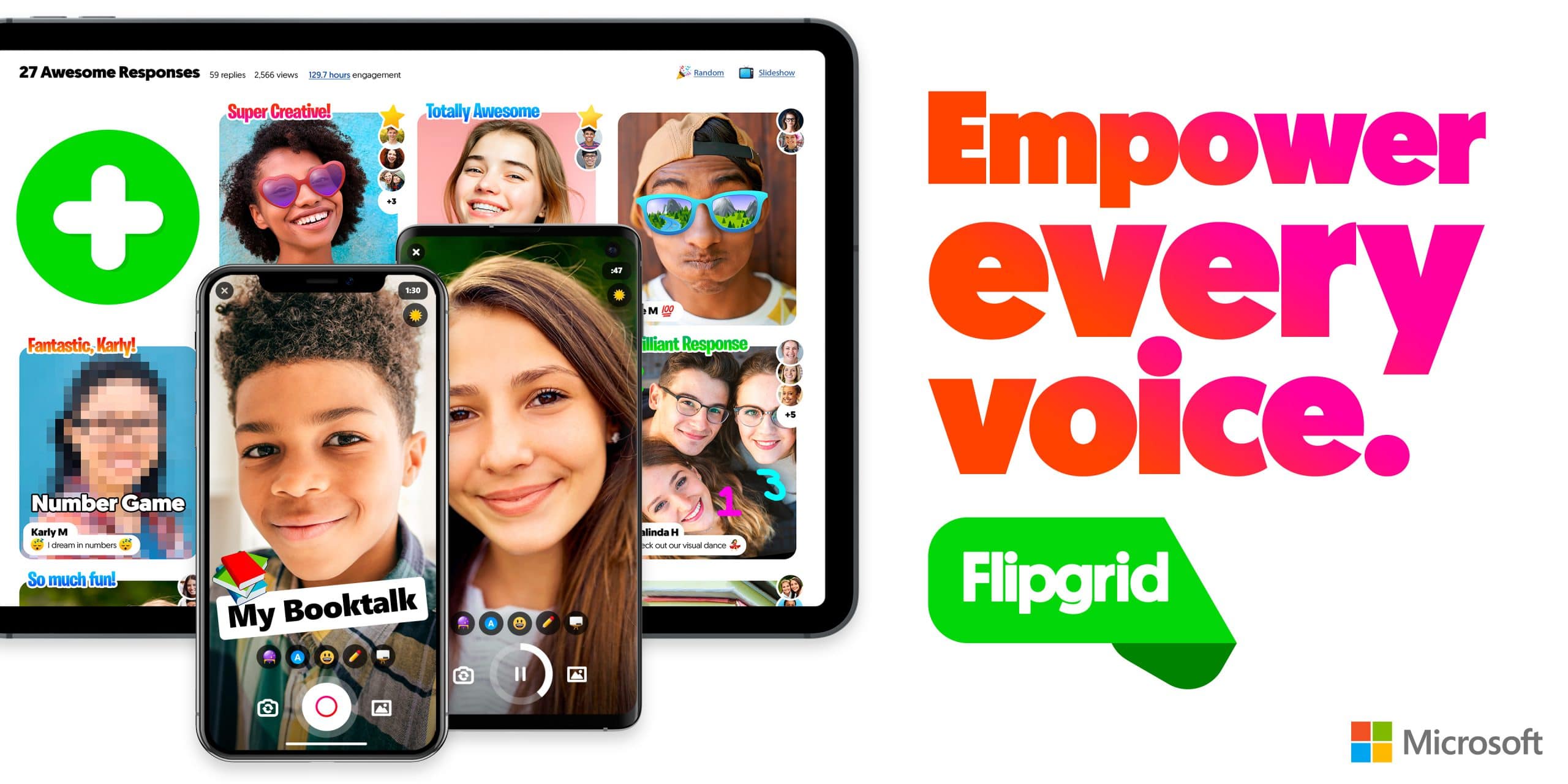A Digital Handbook on Technology Integration
Richard Byrne operates one of the ed tech world’s best award winning blogs on using tech in the classroom, is a Google Certified Trainer, former teacher, and has been invited to speak on six continents. His blog is consistently one of the best resources on the web to get great tips and tricks, and learn about new tools that provide great opportunities for learning. In his own words: “Over the years I’ve reviewed thousands of educational websites and apps. In reviewing all of those resources I realized that all educational technology serves one of three basic purposes; discovery of information, discussion of information, and demonstration of knowledge. While demonstration and creating demonstrations is the most fun use of technology, the discovery and discussion aspects are just as important. The discovery, discussion, demonstration framework is the basis for all of my professional development webinars.
Get the FREE handbook and subscribe to his blog here: https://practicaledtech.com/free-handbook/
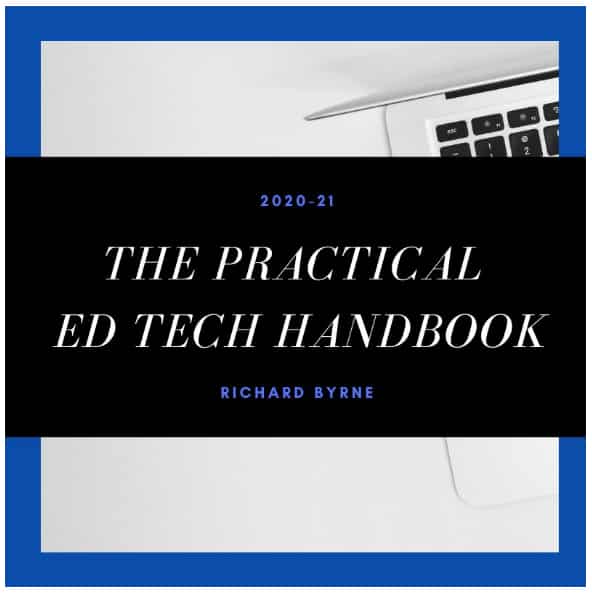
Teachers can now log into the district’s Canvas — 5 Ways to Get Started
A few thoughts on technology and learning…
Learning a new software platform is challenging. We get that. We are learning them all of the time! Please know that we are here to help in the best ways we know how. Outside of the many learning opportunities below, please remember that you can also book a 1:1 appointment with a Tech Integration Specialist who can support you with instructional software like Canvas or engage in thought partnership with you for using technology in your instruction. If you have more technical and hardware challenges, please submit a service request. You can get to either link via the icons below.

 What we all understand is that technology moves so fast, and in the shadow of what may become known of The Great Pandemic, our technology challenges have been many. Canvas will be no different. It will be a great challenge to be certain, but we know that Canvas will be powerful when it’s used with a keen eye toward supporting students with more personalized learning opportunities.
What we all understand is that technology moves so fast, and in the shadow of what may become known of The Great Pandemic, our technology challenges have been many. Canvas will be no different. It will be a great challenge to be certain, but we know that Canvas will be powerful when it’s used with a keen eye toward supporting students with more personalized learning opportunities.
Approaching the platform of Canvas with our very core values at the center, and keeping in mind principles of the Triple-E Framework and Universal Design for Learning, along with focusing on creating a student centered virtual classroom, will allow us to transcend the challenges that we face. We all agree that learning happens in many ways, and we all won’t learn the same as we move into a new virtual school year, and Canvas offers a way to achieve what might seem impossible with any other platform. Below you will find 5 ways to get engaged with Canvas. Thank you for your patience and bravery at this time.
5 ways to get started with Canvas
- You can log into the Canvas platform by navigating here and using your P-CCS Google credentials: https://pccsk12.instructure.com/
- Once you are logged in via your P-CCS Google credentials and you land on the Dashboard of Canvas, you are ready to engage! Explore! Please note the “Help” icon where you will find a wealth of resources that will help you, including a 27/7 helpline phone number.
- You will find the “Growing With Canvas” course that is an optional training course, and you are welcome to take the course if you choose. Remember, you won’t see all of your courses or students until the schedules are completed at the building level. Remember too, you can export any course content you or others previously made and then import it into a course. While building a course, look for the “arrow in” icon
 at the top right corner which is the “Help” for whatever part of Canvas course building you are in.
at the top right corner which is the “Help” for whatever part of Canvas course building you are in. - Outside of the “Growing With Canvas” course, you might also choose to learn via our live and interactive webinars, which also include opportunities to learn more about Zoom which will integrate with Canvas as well: https://bit.ly/pccstechpd
- To learn more asynchronously, visit the Digital Teaching Hub Canvas Page: https://sites.google.com/pccsk12.com/dth/canvas
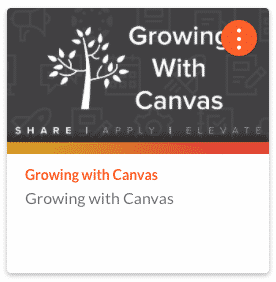
Optional Tech PD for Canvas and Zoom
Hello PCCS Staff,
We hope you are having a fun, relaxing, and safe summer. To support the rollout of both Zoom and our new district-wide LMS, Canvas, the technology integration specialists will be offering a number of optional virtual trainings during various dates in the month of August. While there will be a 6-hour PD on September 1st that will include workshop time with colleagues, we know that many teachers and staff want to get started right away. Here is what you can look forward to in the coming weeks:
- Engaging Students in Zoom (50 min): In this session, you will learn how to engage with students using the Zoom platform and cover features such as breakout rooms, polling, the virtual whiteboard, and more.
- Introduction to Canvas (50 min)*: Canvas will be our new Learning Management System for the 2020-2021 school year. During this session, participants will be able to learn why we chose Canvas, take a tour of the platform, and discuss some of the ways to engage students in Canvas.
- Creating in Canvas (3 hrs.)*: Canvas, our new district LMS (Learning Management System) has many features including assignments, modules, quizzes, conditional releasing, and a video studio. During this time participants will learn about these various features, and have some time to collaborate with TIS and other teachers on how to use the platform.
*Please create a free account and use your __@pccsk12.com account email: https://www.instructure.com/canvas/try-canvas (we have confirmed that any content created in these accounts will be able to be transferred to your district account when it becomes available).
To access and add these virtual trainings to your Google Calendar click: http://links.pccsk12.com/aug2020techpd
We have also included a number of other trainings in our calendar, and if you would like to subscribe to our calendar simply click: http://links.pccsk12.com/subscibetotis
Please let us know if you have any questions or concerns,
Matt and Rick
Interested in Zoom training this weekend?? SimpleK12 offers a free 30 minute webinar at 10 am on Saturday, August 8th entitled Using Zoom Video Conferencing Tools for Student Engagement.
Have a district Windows laptop that has begun to show a blue alert box?
The following blog post was initially shared this past April and remains relevant for a growing number of district laptop users…. At some point you may see a blue alert window declaring Your Windows license will expire soon; You need to activate Windows in settings. There is no need to panic.

Our laptop’s Window licensing usually renews automatically through the district server, however you need to be on our network for that to happen and many haven’t been for long enough to trigger this warning. To reset your license for another 180 days of use, when convenient within two weeks of first seeing that warning, head to any district building with your laptop. You don’t need to actually enter the building, you just need to be close enough to have the laptop connect to the district Wi-Fi. It’s even possible at some of our locations to remain in your car and still be close enough to get a signal. While remaining connected to the district Wi-Fi (either PCCSK12- Secure or PCCSK12-Staff), completely restart the laptop, then log into it and make sure it completes the log in process. Surf somewhere on the internet to confirm that you remained connected. Doing this should suffice to reset the license counter for another six months and you’re good to leave, mission accomplished.
If you still cannot get the alert to go away after doing the above, please submit a service ticket and our department can assist you with other steps to take.
FlipgridLIVE 2020: The All-New Flipgrid
On June 30th, Flipgid announced the all new Flipgrid with updates during their biggest annual educator celebration: FlipgridLIVE! Every change to Flipgrid is driven by your ideas, your stories and your feedback.
These Flipgrid updates will launch starting August 5 and continue monthly into the fall. Check out the full FlipgridLIVE broadcast and keep reading for a look back at Flipgrid’s biggest updates: https://blog.flipgrid.com/news/flipgridlive2020
Summer Learning Blitz!
As Wayne RESA continues to develop new ways to support literacy across Wayne County, they are sharing their first Wayne County Summer Learning Blitz. The Learning Blitz consists of free webinars offered daily in August from 3:00-4:00 pm.
Although the focus is on implementing essential practices in remote settings, technology integration within face-to-face settings can be used to enhance current practice – making these sessions applicable no matter the school model for the coming school year.
To provide synchronous and asynchronous options, sessions will be recorded and emailed to all who register. These recordings will also be archived on the Literacy Learning Network website.
In addition to the webinars, interested coaches and instructional leaders are invited to join a 30 minute facilitation debrief, immediately following most sessions. During this time, participants will be provided ideas and facilitation resources to support the delivery of this learning within their own school setting. The goal is to empower literacy coaches and staff responsible for professional development within their individual districts.
All webinars are grounded in early literacy and all educators are welcome. There is no cost. See the attached flier for topics and registration links.
Digital Subscriptions Update for Teachers and Students
For those interested in reviewing the confirmed digital subscriptions for the coming 2020-2021 school year, please check out the dynamically linked spreadsheet below. It will be updated with any new information should changes or new subscriptions be adopted. This sheet will be published via the Home Teaching Hub as well. If you need additional support please connect with a Tech Integration Specialist at tis@pccsk12.com
School Is Out For Summer, But We’re Still Here To Help!
Summer is here and we want to remind you that we’re here to support your personal and professional learning over the summer. We know that next year is going to look a bit different with all of the challenges of Covid-19 and re-opening schools and we want to support you in any way we can! There are some opportunities we’re creating to support you as you think about next year and we will be announcing them via The Home Teaching Hub, Tech Blog, and Professional Learning Calendar.
Please note, we have summer 1:1 appointment hours available Monday through Friday. Just navigate to our Calendly link to schedule time with a Tech Integration Specialist. We can help you with specific tech tools or planning for a blended or virtual learning environment or assist you with other tech integration wonders: https://calendly.com/tis-pccs/15min
Consider also adding the professional learning calendar to your Google Calendar so you can get updated directly on your Google Calendar of any newly released learning opportunities. To do so, see guidance below.
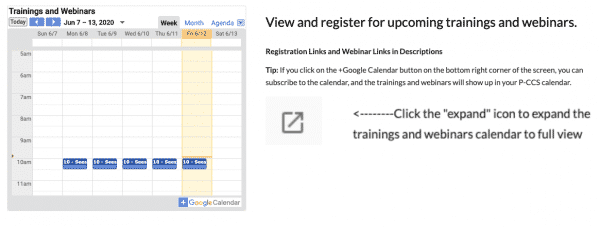
End of Year Google Classroom Cleanup
Google Classroom
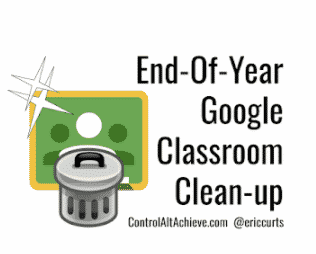 As staff end their year with students, there are several recommendations to consider. You can read more, watch a video, or listen to the podcast from Eric Curts here: controlaltachieve.com/2019/05/classroom-cleanup.html
As staff end their year with students, there are several recommendations to consider. You can read more, watch a video, or listen to the podcast from Eric Curts here: controlaltachieve.com/2019/05/classroom-cleanup.html
Here are the top tips to consider:
Tip #1 – Return all student work
Tip #2 – Unenroll students from old classes
Tip #3 – Archive old classes*
Tip #4 – Remove old class calendars
Tip #5 – Move old class folders in Drive
*Keep in mind that archiving the classes will remove access for students, so if students still need access for some reason, wait until later in the summer to archive. Once the school year has ended, there are some important steps you should take in your Google Classrooms. It’s important to archive finished classes so students don’t see older classes in their dashboards when they login to Google Classroom. Remember, you can use posts/materials from older classes or copy those classes completely for next year.
Archiving a Class
Archiving classes is important so that students do not see old classes in their Google Classroom dashboards when they login. It also declutters your own active Classroom dashboard. Remember, you can always go back and look at archived classes and copy them or use posts/materials/assignments from them. They are not gone forever.
How to Archive a Class
- From the Google Classroom dashboard where you can see all of your classes, click on the 3 vertical dots of the class you’d like to Archive
- Choose Archive from the menu.
- Read the warning and if you’re sure about what you’re doing, click Archive once more.
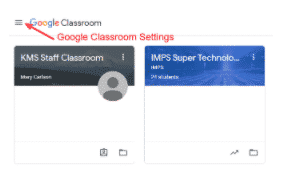 How to View and/or Restore Archived Classes
How to View and/or Restore Archived Classes
- From the Google Classroom dashboard, click on the 3 vertical lines (pancake stack) on the upper left side of screen.
- At the bottom of the slide-out settings menu will be “Archived Classes”. Click on that to see all of your Archived classes. You can look at them and interact with them just like classes that are active.
- You can restore an archived class by clicking the 3 vertical dots of the archived class and choose the Restore option.
Copying a Class
Copying a class creates a copy of the class with all of the materials and assignments in DRAFT status and with no students. It’s highly recommended that you do this from year to year instead of dumping students out of last year’s classroom and adding new students in.
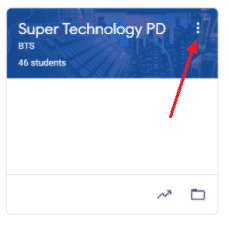 To Copy a Class
To Copy a Class
- From the Google Classroom Dashboard click on the 3 vertical dots in the right corner of the class you want to copy.
- Click on Copy
- Give the new class a name along with a section title. I recommend using the year or semester somewhere in the name or section to make it easier to find later.
- Click Copy when satisfied.
- It will take a minute or two, but then the newly copied class will appear in your Classroom Dashboard. It will be grayed out until it is ready for you to start working in it. Larger classroom will take longer to activate.





